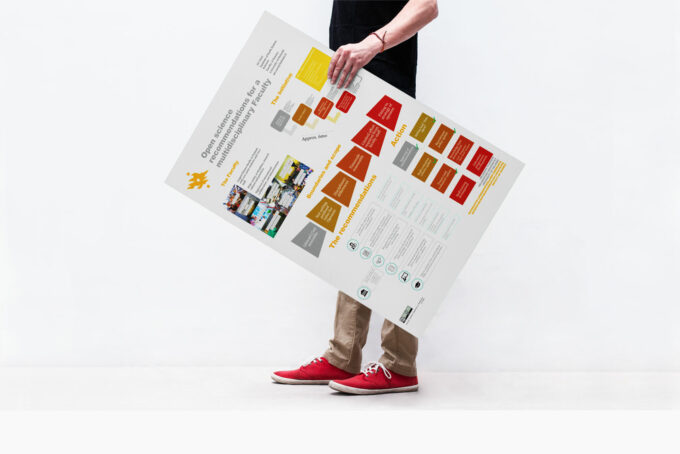
Working Out Loud: How to Support the Learning Library
Working Out Loud is a method that promotes networking, collaboration and openness. It encourages us to share concept ideas with others at an early stage and get help to develop a topic further. In her award-winning bachelor thesis, Carina Dony has examined the contribution it can make to the learning library.
we were talking with Carina Dony
 Working Out Loud (WOL) can promote openness and collaboration. It has recently been announced that Carina Dony’s bachelor thesis „Working Out Loud zur Unterstützung der Lernenden Bibliothek“ (“Working Out Loud to support the learning library”, German) is among the winners of the 2020 b.i.t.online Innovation Prize (German). We interviewed her about the role of WOL for learning libraries.
Working Out Loud (WOL) can promote openness and collaboration. It has recently been announced that Carina Dony’s bachelor thesis „Working Out Loud zur Unterstützung der Lernenden Bibliothek“ (“Working Out Loud to support the learning library”, German) is among the winners of the 2020 b.i.t.online Innovation Prize (German). We interviewed her about the role of WOL for learning libraries.
Ms. Dony, first of all, many congratulations on winning the 2020 b.i.t.online Innovation Prize for your bachelor thesis on the use of Working Out Loud in libraries. How did you become aware of the topic of Working Out Loud? And what exactly did you examine in your bachelor thesis?
Thank you for your congratulations and the invitation for this interview.
I became aware of Working Out Loud during a study project with my tutor, Dr Wittich. Within the project group, we established our own circle and met up with each other every week online. During this phase, we thought about which target groups WOL could be suitable for. My bachelor thesis represents a further exploration of this topic. Through WOL, I learned to put new habits into practice, to network and to work in a team in a generous way. I wanted to share these experiences and put them in a larger context.
With my bachelor thesis I tried to find out how the Working Out Loud method can support libraries on their path to becoming learning organisations. Nowadays we work in a complex world, the “VUCA World”, which is characterised by volatility, uncertainty, complexity and ambivalence. And in order to deal with this, we require two fundamental things: on the one hand, an organisational structure that offers a high level of flexibility in its work processes and, on the other, employees who learn actively to shape these change processes. Changing structures in an organisation can be a lengthy process that managers in particular have to deal with. Individual employees can do something, however, by learning to deal with changes and adapt to lifelong learning. John Stepper developed the Working Out Loud programme, which lasts twelve weeks, for the personal (further) development of individuals.
What’s special about the WOL method, what advantages does it offer and which abilities does it train?
WOL stands out because of its simplicity. At the beginning of my circle, which served as a practical introduction to WOL, I didn’t realise where these twelve weeks would lead me. Many exercises sound banal, and it’s not initially clear what they are supposed to do. Nevertheless, over the course of the twelve weeks, the exercises led to the development of another mindset, another way of thinking and acting of the participants. Working Out Loud is a way for people to learn how to deal with one another, and to work and network in an appreciative way. WOL encourages us to share concept ideas with others at an early stage and get help to develop a topic further. Many exercises that come up during the twelve weeks also train social behaviour and empathy.
What potential do you see for WOL in libraries and what benefit would an increased use have?
WOL can change the perspective of the individuals and lead to them paying attention to the “big picture”, such as the goal of an institution. I see potentials at both the internal and external level. Internally, WOL can stimulate communication and an appreciative feedback culture, thereby improving collaboration. Cross-departmental work can also be promoted. Externally, I see great potential in having the courage to get in touch with other libraries and similar institutions (such as archives and museums) and to trigger new collaborations. Many libraries like to keep their knowledge to themselves and only present selections of it at congresses. Most libraries are publicly owned and therefore (in my opinion) not so strongly subjected to economic competition. We should make our knowledge available faster and in open formats; and we should discuss it more. In this way, we could keep our library services attractive and further extend them. Learn from one another and with one another, and thereby grow. We fulfil an important task for our user groups and should also remain a contact partner in the future, too. In times of “fake news” and increasing digitisation, citizens need a strong (educational) partner who helps them take a critical look at these topics.
How can WOL support the learning library?
A learning organisation is heavily dependent on the involvement of its employees. WOL is a programme that gives individuals a voice. It has many approaches that promote agile working and knowledge management. These include employees learning to organise themselves (even better), to work within a team and to network globally. In week 8, there’s an exercise which is intended to record the progress towards the selected goal in a diagram, and in week 3, the topic of time management is intensively discussed. Overall, I had the impression that through the WOL method, all thought and work patterns were reconsidered and adapted so that work processes run more flexibly and dynamically.
Which libraries are already implementing WOL?
I’m not currently aware of any libraries who have tried it. In my thesis, I could only examine it theoretically, owing to the time frame, and recommend that people simply give it a try. I would be delighted if a libraries circle was set up.
How could libraries proceed in order to implement WOL?
WOL cannot be “implemented”. It can’t be prescribed “from above”. The programme can only be established on a voluntary basis. However, it’s an advantage if the management level takes a clear position on the topic and encourages people to start circles. A first incentive is to allow the employees to have this learning time. For example, this could mean that it’s desirable to allow the meeting to take place during work hours. Within the organisation, it’s also a good idea to have in-house contact persons for the topic of WOL, in case there are any queries. It’s also easy to approach the WOL online community, who are very happy to answer these types of questions.
How can individual colleagues use WOL for themselves, even without institutional support?
Start a circle in your private environment or look for outside persons with the Circle finder. Take the positive experiences with you to your own institution and make people curious about it. Simply show what has changed in yourself. The vibrancy of WOL is revealed in its different facets. Examples such as emphatic and appreciative communication with colleagues, or promoting communication in a team, can be small steps.
After completing her traineeship as specialist in media and information services at the University Library, Kaiserslautern in the year 2013, Carina (Twitter: @CarinaD688) worked at the University Library Mannheim until 2019. From 2015 to 2019 she completed an extra-occupational study course in information management at the University of Applied Sciences and Arts in Hannover. Since August 2019 she has been working in the on-site service department of the school library service at Frankfurt (Main) City Library.
View Comments

Altmetrics: How Researchers Assess the Significance for Scholarly Impact
Altmetrics have been an important topic in the context of open science for some time....



